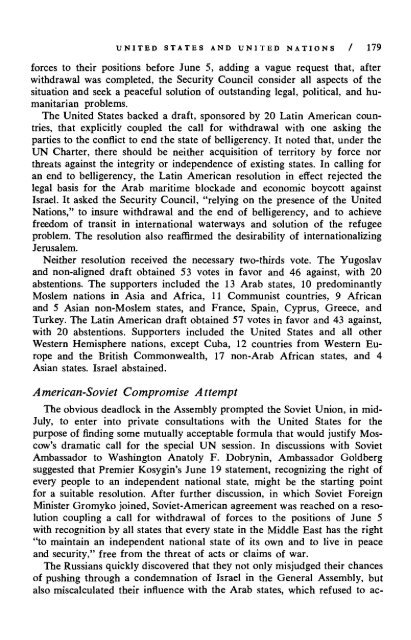1968_4_arabisraelwar
Create successful ePaper yourself
Turn your PDF publications into a flip-book with our unique Google optimized e-Paper software.
UNITED STATES AND UNITED NATIONS / 179<br />
forces to their positions before June 5, adding a vague request that, after<br />
withdrawal was completed, the Security Council consider all aspects of the<br />
situation and seek a peaceful solution of outstanding legal, political, and humanitarian<br />
problems.<br />
The United States backed a draft, sponsored by 20 Latin American countries,<br />
that explicitly coupled the call for withdrawal with one asking the<br />
parties to the conflict to end the state of belligerency. It noted that, under the<br />
UN Charter, there should be neither acquisition of territory by force nor<br />
threats against the integrity or independence of existing states. In calling for<br />
an end to belligerency, the Latin American resolution in effect rejected the<br />
legal basis for the Arab maritime blockade and economic boycott against<br />
Israel. It asked the Security Council, "relying on the presence of the United<br />
Nations," to insure withdrawal and the end of belligerency, and to achieve<br />
freedom of transit in international waterways and solution of the refugee<br />
problem. The resolution also reaffirmed the desirability of internationalizing<br />
Jerusalem.<br />
Neither resolution received the necessary two-thirds vote. The Yugoslav<br />
and non-aligned draft obtained 53 votes in favor and 46 against, with 20<br />
abstentions. The supporters included the 13 Arab states, 10 predominantly<br />
Moslem nations in Asia and Africa, 11 Communist countries, 9 African<br />
and 5 Asian non-Moslem states, and France, Spain, Cyprus, Greece, and<br />
Turkey. The Latin American draft obtained 57 votes in favor and 43 against,<br />
with 20 abstentions. Supporters included the United States and all other<br />
Western Hemisphere nations, except Cuba, 12 countries from Western Europe<br />
and the British Commonwealth, 17 non-Arab African states, and 4<br />
Asian states. Israel abstained.<br />
American-Soviet Compromise Attempt<br />
The obvious deadlock in the Assembly prompted the Soviet Union, in mid-<br />
July, to enter into private consultations with the United States for the<br />
purpose of finding some mutually acceptable formula that would justify Moscow's<br />
dramatic call for the special UN session. In discussions with Soviet<br />
Ambassador to Washington Anatoly F. Dobrynin, Ambassador Goldberg<br />
suggested that Premier Kosygin's June 19 statement, recognizing the right of<br />
every people to an independent national state, might be the starting point<br />
for a suitable resolution. After further discussion, in which Soviet Foreign<br />
Minister Gromyko joined, Soviet-American agreement was reached on a resolution<br />
coupling a call for withdrawal of forces to the positions of June 5<br />
with recognition by all states that every state in the Middle East has the right<br />
"to maintain an independent national state of its own and to live in peace<br />
and security," free from the threat of acts or claims of war.<br />
The Russians quickly discovered that they not only misjudged their chances<br />
of pushing through a condemnation of Israel in the General Assembly, but<br />
also miscalculated their influence with the Arab states, which refused to ac-


